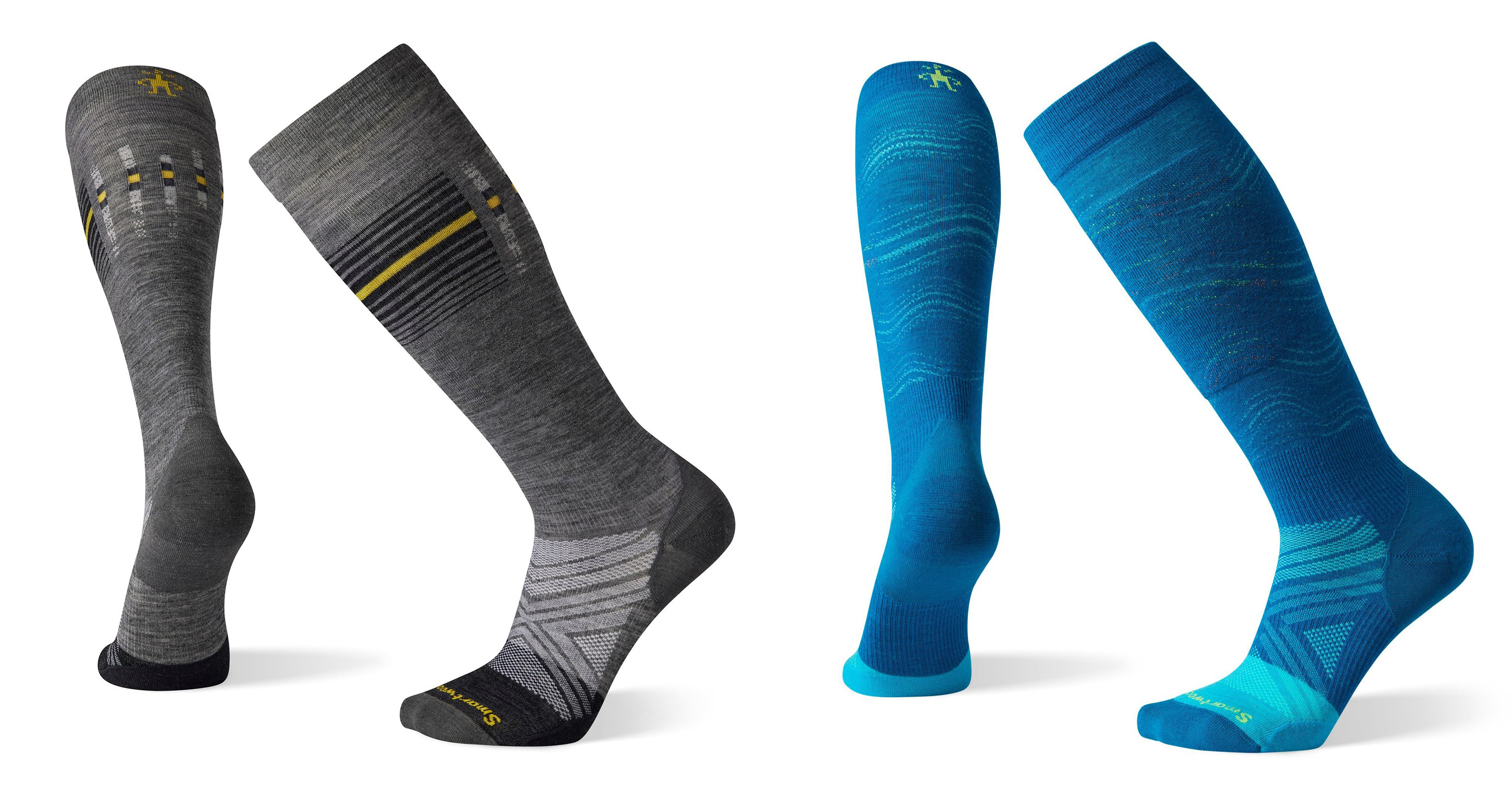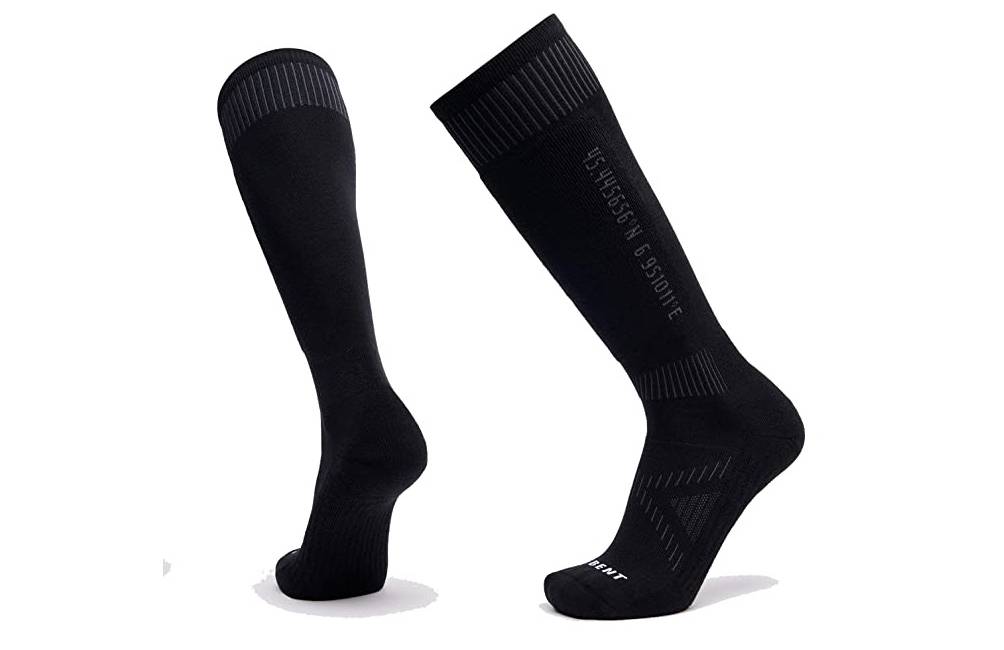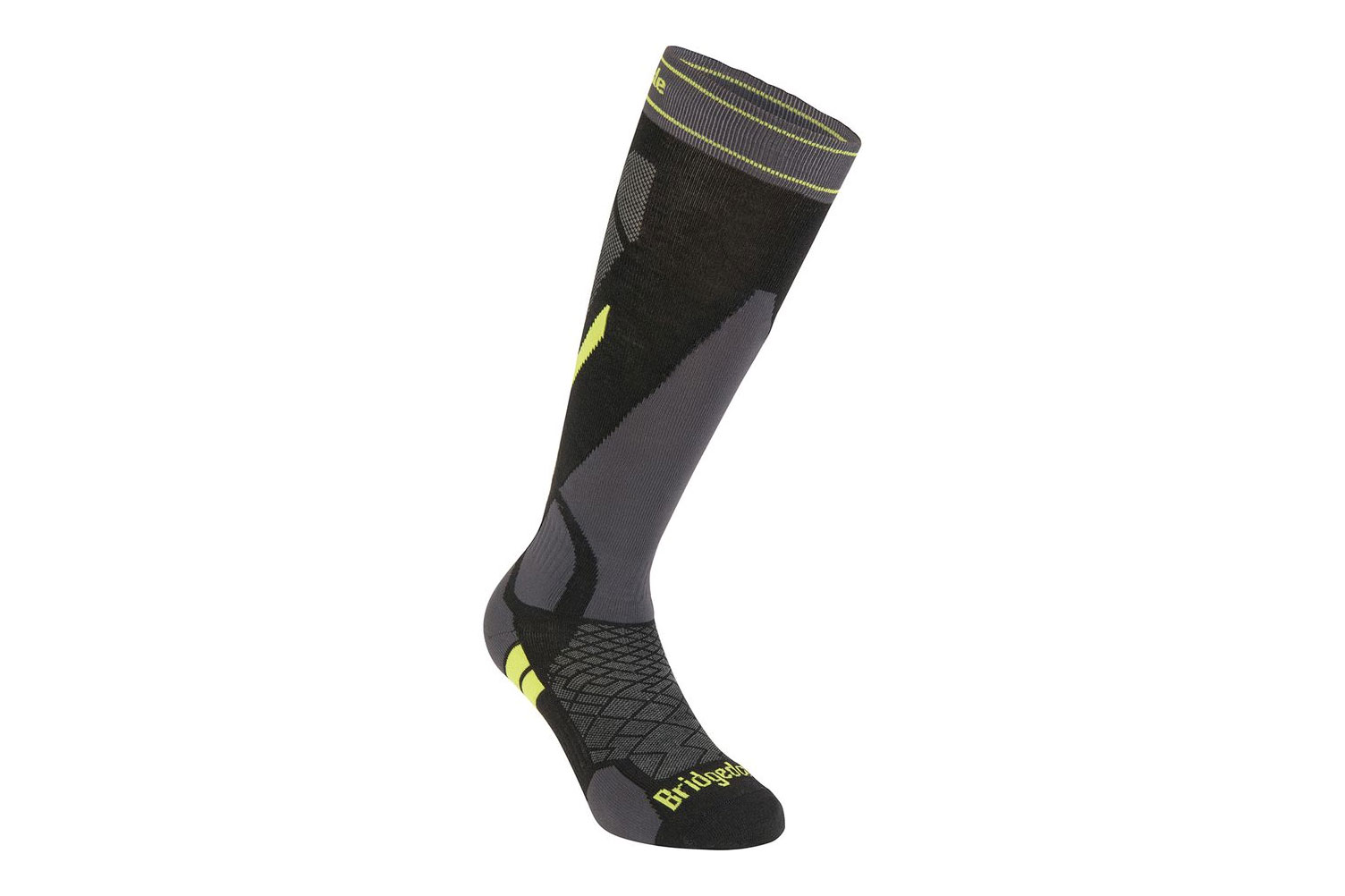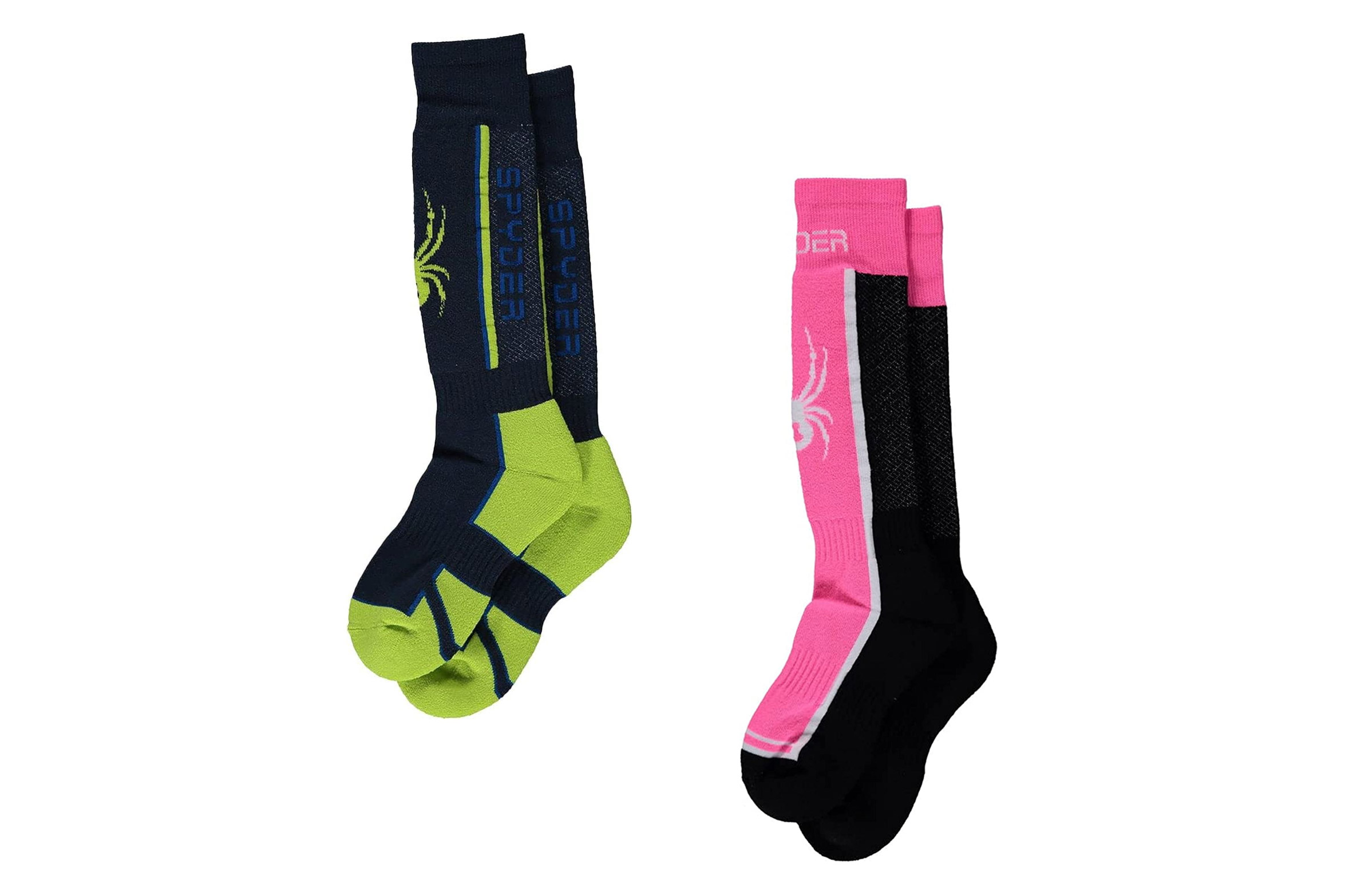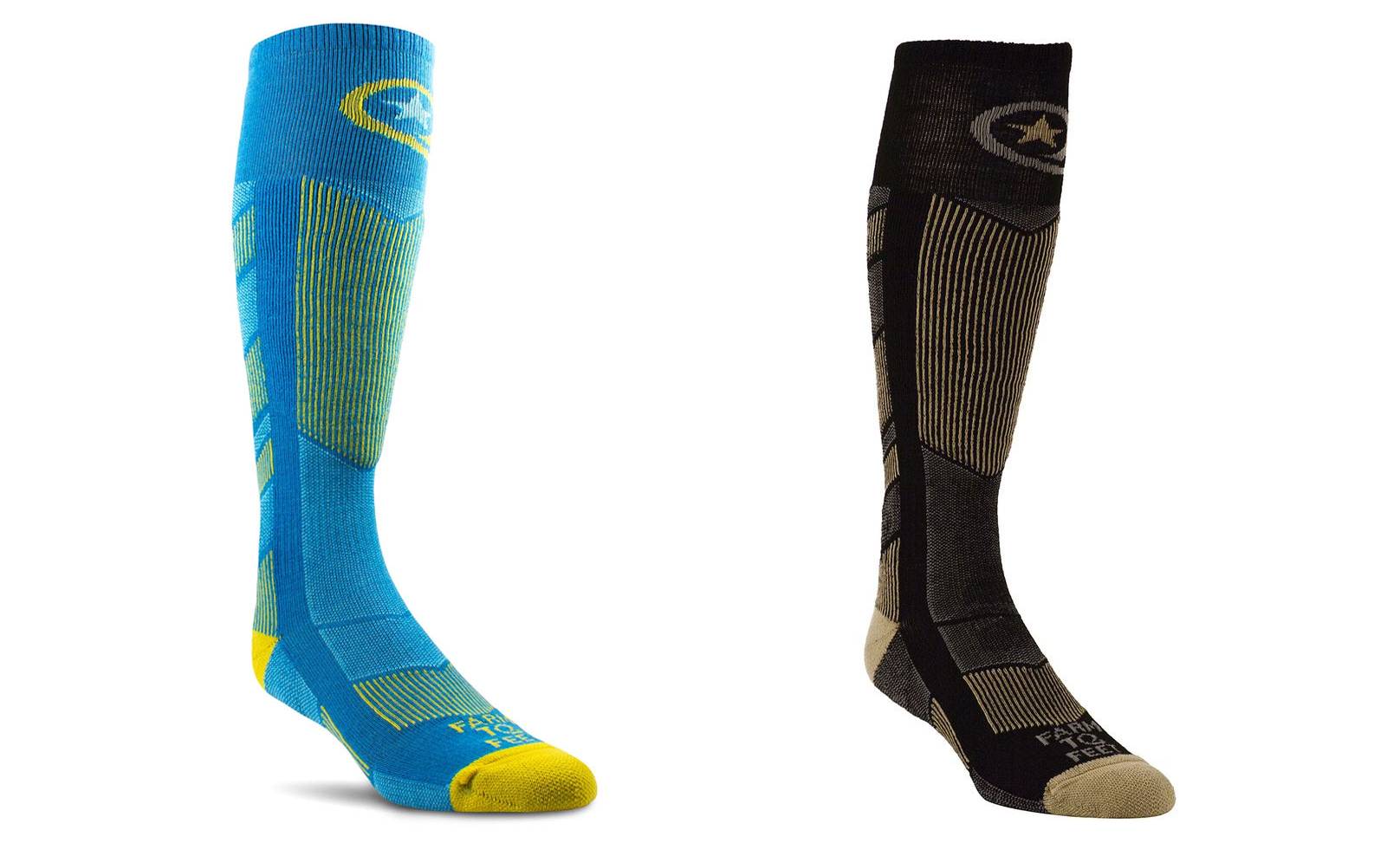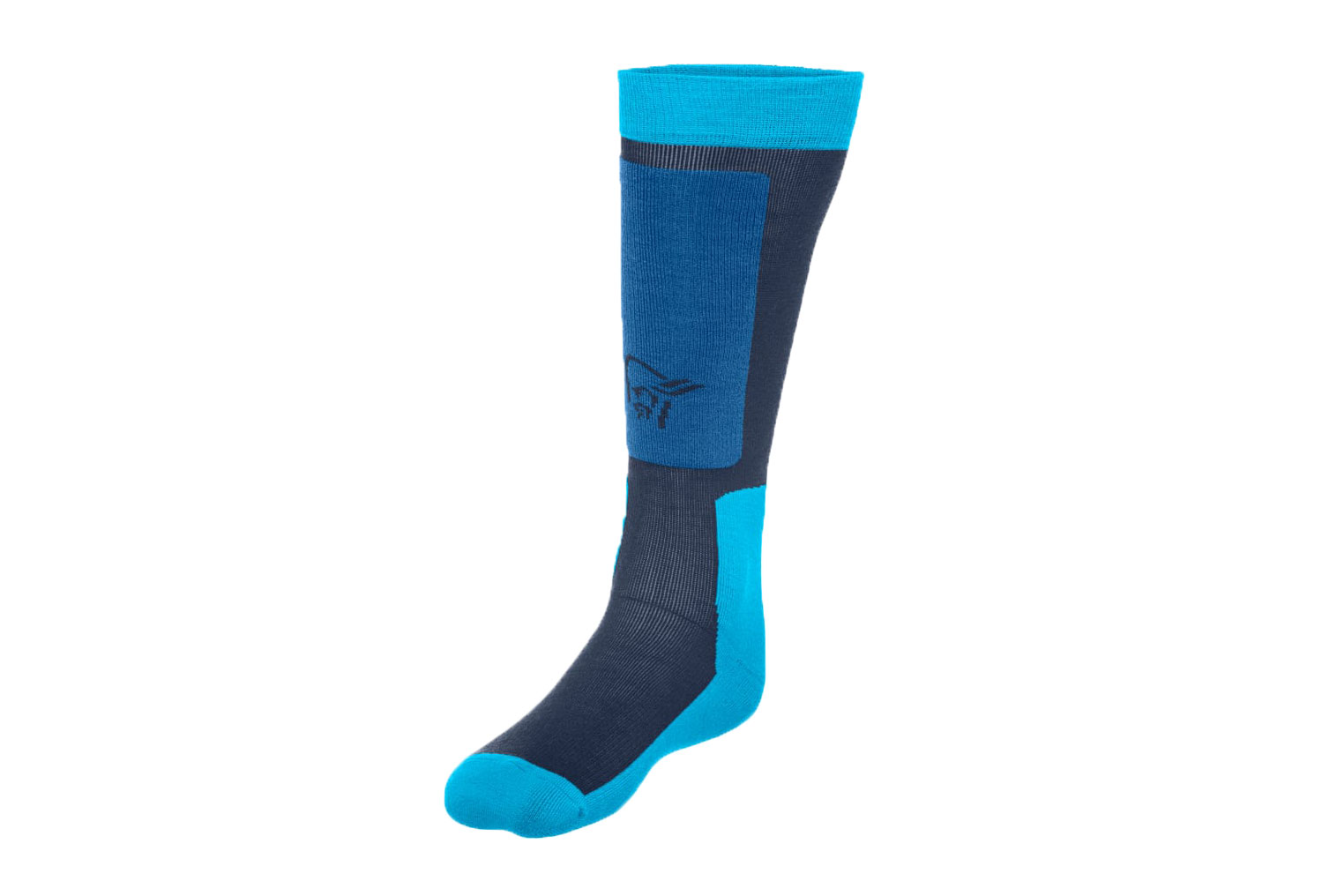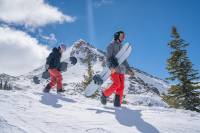The Best Ski Socks of 2022
Winter is in full swing. If you’re like us, that means you’ll be spending a lot of time in the snow. These are the best ski socks to keep your feet happy and warm all winter long.
Socks are critical to keeping feet warm and comfortable. Whether you’re skiing, snowshoeing, snowboarding, or sledding with the family, socks perform a critical role in your winter comfort. With this list, we’ve got you — and your feet — covered.
We looked for socks that offer a good balance of breathability, cushion, stretch, and durability. Then we checked each brand’s sock performance through online reviews across multiple platforms. To choose the best of the best, we ranked each sock both on the quality and volume of positive reviews and feedback.
Remember, socks are tricky. No one sock is going to fit and serve everyone’s needs, but the ones on our list are by far the most popular and most trusted. Scroll through our picks for the best ski socks for 2023 or jump to a category below.
To learn more about how socks differ from one to the next, read the buyer’s guide and FAQ. Also, check out our comparison chart to see how our choices stack up against one another.
- Best Overall Ski Socks
- Best Budget Ski Socks
- Runner-Up
- Best for Backcountry & Uphill
- Best Socks for Nordic Skiing
- Best Ultra-Thin Ski Socks
- Best of the Rest
The Best Ski Socks of 2023
Best Overall Ski Socks: Smartwool Ski Full Cushion — Men’s & Women’s
Smartwool built its full cushion series for performance. These socks ($29) have garnered multiple reviews from customers touting them as the “best ski socks ever.” They have body-mapped mesh zones for added breathability, a seamless toe for enhanced comfort, and men’s- and women’s-specific fits.
These socks are awesome for both comfort and warmth. Customers love them for skiing, and lots of customers commented on having multiple pairs. Other features reviewers liked about this sock were its durability even after washes, performance in the backcountry, and comfort in ski boots.
Specs:
- Fabric: 64% merino wool, 34% nylon, 2% elastane
- Thickness: Light/medium
- Length: Over the calf
Pros:
- Comfortable seamless fit
- Holds up to many washes
Cons:
- Some customers reported minor fraying issues
Check Men’s Price at REI Check Women’s Price at Amazon
Best Budget Ski Socks: Wigwam Snow Sirocco Ski Sock
Don’t let the long list of fabric materials fool you — this sock still delivers. The Wigwam Snow Sirocco sock ($17) has a seamless toe and is fully cushioned to offer as much warmth as possible. The sock also has a reinforced shin panel with extra cushion. If you’re looking for a sock that will deliver on warmth and not break the bank, this is it.
A huge number of customers raved about the comfort and warmth of the Snow Sirocco socks, despite the sock not being too thick. And most customers were very pleased with these socks’ performance in cold winter climates, although a few thought they weren’t warm enough. Regarding quality, most customers were happy, though a few mentioned the sock will suffer in the wash.
Specs:
- Fabric: 42% wool, 24% stretch nylon, 21% polypropylene, 7% stretch polyester, 5% Olefin, 1% spandex
- Thickness: Medium
- Length: Mid-calf
Pros:
- Affordable
- Cushioned shin panel feels great in ski boots
Cons:
- Vulnerable to fraying after repeated washes
Check Price at AmazonCheck Price at Walmart
Runner-Up Best Ski Socks: Darn Tough Over-the-Calf Yeti Cushioned Socks
Darn Tough’s over-the-calf, cushioned Yeti is a great sock recommended by lots of skiers across the board. The cushioned sock ($29) has a performance fit with natural microbial properties thanks to the sock’s large percentage of merino wool.
Customers loved these over-the-calf socks’ support and performance while skiing, especially the warmth in colder conditions. Almost all the reviews mentioned that with these socks you get both awesome quality and fun style. Note: A few customers commented that the socks have a tighter fit.
Specs:
- Fabric: 64% merino wool, 32% nylon, 4% Lycra spandex (men’s); 68% merino wool, 28% nylon, 4% Lycra spandex (women’s)
- Thickness: Medium
- Length: Over the calf
Pros:
- Good for cold conditions
- Odor resistant
Cons:
- Tighter than average fit
Best Socks for Nordic Skiing: Darn Tough Oslo Nordic Boot Sock — Men’s & Women’s
Recently updated is Darn Tough’s merino-forward, cross-country-skiing-specific ski sock. The Darn Tough Oslo Nordic ($27) is made with a 52% nylon, 45% merino wool, and 3% spandex blend — fairly standard compared to other ski socks on this list.
We appreciate the near 50/50 split of synthetic with merino wool (to help wick away sweat and fight odor). But the feature of this sock that really shines is the crew height and style. The sock is comfortable in the toebox, but not too plush/cushioned, and it retains a stay-in-place, athletic fit.
We’ve only been testing for 3 weeks this season but already love the look, height, and feel. We also tried it on with two different nordic boots. If the majority of your winter is spent on the XC trails, we’re confident this is the best ski sock for you.
Specs:
- Fabric: 52% nylon, 45% merino wool, 3% Lycra spandex
- Thickness: Light
- Length: Calf
Pros:
- Stays in place
- Great height for nordic boots
Cons:
- Not ideal for frigid conditions
Check Men’s Price at REICheck Women’s Price at REI
Best Ski Socks for Backcountry & Uphill: CEP Ski Touring Compression Socks — Men’s & Women’s
CEP’s expansion of the Ski Collection and ski touring sock ($55) has been a blessing to our hardworking feet. Constructed with a honey-pot of graduated compression that’s not too tight (a moderate 20-30 mmHg), these backcountry-centric socks stay put no matter how many vertical feet we’re climbing and descending each day in ski or snowboard boots.
We’ve experienced no blisters, fabric clumping, odors, or shifting underfoot, even on sunny, calm days that reach 40 degrees Fahrenheit.
This sock is a good choice for backcountry travelers that prefer nice padding on the shin and around the ankle bones but an otherwise light, quick-drying sock that hugs like a hero. Sock sizes are also tailored to the calf circumference.
Specs:
- Fabric: 76% polyamide, 13% merino wool, 11% spandex
- Thickness: Light
- Length: Calf
Pros:
- Just-right compression
- Quick to dry
Cons:
- Not the best choice for the coldest days
Check Men’s Price at AmazonCheck Women’s Price at Amazon
Best Ultra-Thin Ski Socks: Dissent GFX Compression Hybrid
If you’re looking for a performance sock with ultimate breathability and an as-close-as-it-gets fit inside your boots, look no further. The Dissent GFX Compression Hybrid ($60) is thin with low-profile padding, and the polygiene material does a good job masking odors.
The addition of NanoGlide fibers helps to prevent friction, despite being thin, while also enhancing hydrophobic (quick drying) ability: We’ve never experienced blisters or hot spots with these socks. We like the slight cushion over the shin and around the ankle and the tight-fitting seamless toe. After testing for several seasons, there’s only a bit of pilling but no holes, either.
Customers celebrated the anatomical design of the socks, the excellent breathability (especially for sweaty, hot feet), and lack of slippage.
Specs:
- Fabric: Polygiene
- Thickness: Light
- Length: Calf
Pros:
- Breathable
- Form-fitting anatomical design
Cons:
- Expensive
Check Price at evoCheck Price at Dissent Labs
Best of the Rest
STOX Energy Recovery Compression Socks — Men’s & Women’s
STOX Energy Socks ($50) is based in Amsterdam, Netherlands, and recently launched in the United States, which we greatly approve. After a big day on the slopes or in the backcountry, it’s nice to pull on these to-the-calf socks for a compression-supported recovery session.
We definitely wouldn’t sleep in this tight pair or wear them when our feet are cold, but they deliver 23-32 mmHg of graduated compression, which is a slightly stronger hold than performance-oriented pairs meant for ski or snowboard boots.
Wearers of this compression sock noticed that the design is high quality and effective yet not tight enough to cause pain or discomfort. Several athletes use the socks for recovery and to reduce swelling, inflammation, cramping, and post-activity fatigue.
Specs:
- Fabric: 84% polyamide, 16% elastane
- Thickness: Ultralight
- Length: Over the calf/knee
Pros:
- Helpful recovery aid
- Compressive yet comfortable
Cons:
- Expensive
Check Men’s Price at AmazonCheck Women’s Price at Amazon
Smartwool Kids’ Ski Racer Socks
For kids, you can’t beat the Smartwool Ski Racer socks ($30). Important for kids is a soft feel, but also elements like the socks’ flat-knit toe seam, light cushion, and true-to-size fit.
When you’ve got kiddos out on the slopes, comfort is really important, and these socks deliver. Note: These socks work for kids with children’s shoe sizes 6-13.5 and youth sizes up to 6.
The majority of reviewers said these socks were perfect for kids on the slopes and kept them warm. One reviewer did not like the length of the sock for skiing but did like the quality.
Specs:
- Fabric: 66% merino wool, 32% nylon, 2% elastane
- Thickness: Light
- Length: Tall crew
Pros:
- Warm
- Comfortable flat seams
Cons:
- Some users found them to be a bit short
Smartwool Athlete Edition Ski Race Sock — Men’s & Women’s
These newer-model Smartwool ski race socks really impressed us in testing. Tested and vetted by pro skier Mikaela Shiffrin, the socks have similar tech as other styles, like Smartwool’s Indestructawool construction and elite fit system, but also new design specs as well.
The Pro Ski Race socks ($31) have a slimmer fit, extra-contoured shin cushioning, as well as a wider welt for better comfort. We noticed that they are definitely lighter and stretchier than other Smartwool styles we’ve tried. If you want a sleek sock with no bulk and that’s easy to layer, check these out.
Customers noticed the leaner silhouette of these performance-oriented socks, which some winter enthusiasts prefer while others do not, as well as the sock’s ability to provide warmth while being durable.
Specs:
- Fabric: 57% merino wool, 40% nylon, 3% elastane (women’s: 56% merino wool, 41% nylon)
- Thickness: Light
- Length: Calf
Pros:
- Sleek, performance-oriented fit
- Durable
Cons:
- The thinner profile isn’t great for the coldest days
Check Men’s Price at evoCheck Women’s Price at Amazon
Le Bent Core Light Snow Sock
We’ve never had a ski sock be so buttery smooth against our feet. This low-profile sock ($28) is an athletic luxury. The fibers cover odors well and the fit doesn’t slide around but isn’t restrictive.
The caveat for ultimate comfort — we’ve noticed that Le Bent socks tend to wear down a tad faster, especially in the heel, compared to other blends. But being below the priciest ski sock on our list, we still think it’s worth having them in our drawer.
Note: There’s a Core Ultra Light Snow Sock if you’re looking to go even leaner with this softie.
Folks who’ve worn these socks note how they rose to their favorite pick, how comfortable they are to wear all day, and that the design helps to prevent blisters while managing sweat.
Specs:
- Fabric: 41% rayon from bamboo, 39% nylon, 18% Merino wool, 2% elastane
- Thickness: Light
- Length: Over the calf
Pros:
- Smooth seamless texture
- Odor-resistant
Cons:
- Expensive
Voormi Ski Sock
The ratings on Voormi’s ski socks ($45) are high, and the positive feedback is definitely echoed by some of our skiers on staff. The brand’s ski sock is made of low-friction-wicking merino wool fibers that keep feet warm and dry.
The sock delivers just the right amount of thermal insulation needed on the uphill and downhill. Plus, the Voormi sock has specific left- and right-foot construction.
This sock delivers. For the price, users loved the warmth and comfort the Voormi ski sock provided. For a lightweight sock, reviewers were impressed. The only con was that some customers commented that they run a bit large, so be sure to check sizing before you order.
Specs:
- Fabric: Fine-micron merino wool blend
- Thickness: Light
- Length: Knee
Pros:
- Warm yet breathable
- Effective across a broad range of conditions
Cons:
- Inconsistent sizing
Check Price at AmazonCheck Price at Voormi
Burton Performance Midweight Socks — Men’s & Women’s
Burton’s Performance midweight socks ($30-40) have some cool features: ventilation panels on the toes and an odor-resistant footbed to give your feet much-needed breathability while skiing. The socks are slightly thinner than other midweight socks but still get the job done — with Sock Lock to prevent slipping and enough warmth for powder days.
Customers liked this sock for both backcountry and front-country use, which is great. Reviewers also called out this sock’s delivery on warmth, durability over time, and that this sock runs true to size (because accurate sizing makes both sock and boot comfort so much better).
Specs:
- Fabric: 38% nylon, 30% merino wool, 30% acrylic, 2% elastane
- Thickness: Medium
- Length: Calf
Pros:
- Top. notch breathability
- Durable
Cons:
- Not the best choice for the coldest days
Check Men’s Price at AmazonCheck Women’s Price at Amazon
Bridgedale Ski Light Merino Endurance Sock — Men’s
Bridgedale’s Ski Light sock ($28) doesn’t have many reviews, but all of them are positive. The men’s-specific-fit ski sock is lightweight, with medium cushioning on the footbed and shin. We like this sock’s nylon and wool blend as well as the comfort it provides. Bridgedale recommends these socks for all-mountain and freeskiing pursuits.
Multiple reviewers commented that they liked the men’s Bridgedale Ski Light socks’ performance fit and thinner construction — thin enough to prevent rubbing or chafing, but thick enough to stay comfortable in a boot. Judging by the reviews, these are a good, all-around ski sock, especially for those looking for socks with a reliable fit.
Specs
- Fabric: 51% nylon, 20% merino wool, 20% polypropylene, 7% Tactel, 2% Lycra spandex
- Thickness: Light
- Length: Over the calf
Pros:
- Warm
- Comfortable
Cons:
- No woman’s option
Spyder Sweep Kids’ Sock — Boys’ & Girls’
Another fan favorite for mini rippers is the Spyder Sweep kids ski sock ($10-19). This sock is great because it has light cushioning, but remains warm enough for kids’ toes if out all day. The ski sock also comes in a range of sizes (XS-XL) — accommodating kids ages 5 up to 15.
The Spyder Sweep sock is made with an all-synthetic blend (more durable for kids), and light cushioning (great for kids in ski clubs or kids who ski race). The Sweep also has a cushioned toe and heel, and compression at the arch.
For parents and kids, these socks are hard to beat. They offer a wide range of sizing and run true to size, and fit well. Plus, they won’t break the bank. The true test: Are they comfortable? Kids said yes.
Specs
- Fabric: 77% acrylic, 22% nylon, 1% elastane
- Thickness: light
- Length: Over the calf
Pros:
- Durable synthetic blend
- Good value
Cons:
- Odor issues
Check Boys’ Price at AmazonCheck Girls’ Price at Amazon
Farm to Feet Park City Midweight Sock
These Farm to Feet ski socks ($42) tick a lot of boxes for us: They’re made from U.S.-sourced merino wool, have a seamless toe construction and, according to lots of customers, work for different types of skiers. They also come in men’s- and women’s-specific styles.
These midweight socks are some of Farm to Feet’s most popular. The Park City Midweights offer excellent performance during rigorous ski days, according to many reviewers, and provide a good level of warmth. A few customer ratings also mentioned their loyalty to the durable brand.
Specs
- Fabric: 61% merino wool, 36% nylon, 3% elastane
- Thickness: Medium
- Length: Over the calf
Pros:
- Good quality materials
- Comfortable
Cons:
- Expensive
Check Price at AmazonCheck Price at Farm to Feet
Norrona Lofoten Mid Weight Merino Sock Long
Norrona probably doesn’t make the top of your winter sock list, but here’s why it should. We like the consistent fit and the combination of both style and quality. They hold their shape and are functional, even on colder days. Norrona also uses uber-soft, traceable, mulesing-free wool in this sock.
Most users liked these midweight socks‘ ($45) comfort and look. People who have used them for a season or more commented on the great-lasting quality and perfect mix of warmth and fit. However, a few noted that they are too hot for ski touring and better for skiing in front- or side-country terrain.
They’re a bit of an investment, but they’re some of the best ski socks on the market.
Specs
- Fabrics: Merino wool, nylon, and elastane blend
- Thickness: Medium
- Length: Calf
Pros:
- Good quality materials
- Durable
Cons:
- Expensive
Check Price at NorronaCheck Price at Camp Saver
Ski Socks Comparison Chart
| Ski Sock | Price | Fabrics | Thickness | Length |
| Smartwool PhD Ski Medium Socks | $27 | 64% merino wool, 34% nylon, 2% elastane | Light/medium | Over the calf |
| Darn Tough Over-the-Calf Yeti Cushioned Socks | $29 | 64% merino wool, 32% nylon, 4% Lycra spandex | Medium | Over the calf |
| Wigwam Snow Sirocco Ski Sock | $17 | 42% wool, 24% stretch nylon, 21% polypropylene, 7% stretch polyester, 5% Olefin, 1% spandex | Medium | Mid-calf |
| Darn Tough Oslo Nordic Boot Sock | $27 | 52% nylon, 45% merino wool, 3% Lycra spandex | Light | Calf |
| CEP Ski Touring Compression Socks | $55 | 76% polyamide, 13% merino wool, 11% spandex | Light | Calf |
| Dissent GFX Compression Hybrid | $60 | Polygiene | Light | Calf |
| STOX Energy Recovery Compression Socks | $50 | 84% polyamide, 16% elastane | Ultralight | Over the calf/knee |
| Smartwool Kids’ Ski Racer Socks | $30 | 66% merino wool, 32% nylon, 2% elastane | Light | Tall crew |
| Smartwool Athlete Edition Ski Race Sock | $31 | 57% merino wool, 40% nylon, 3% elastane | Light | Calf |
| Le Bent Core Light Snow Sock | $28 | 41% rayon from bamboo, 39% nylon, 18% Merino wool, 2% elastane | Light | Over the calf |
| Voormi Ski Sock | $45 | Fine-micron merino wool blend | Light | Knee |
| Burton Performance Midweight Socks | $30-40 | 38% nylon, 30% merino wool, 30% acrylic, 2% elastane | Medium | Calf |
| Bridgedale Ski Light Merino Endurance Sock | $28 | 51% nylon, 20% merino wool, 20% polypropylene, 7% Tactel, 2% Lycra spandex | Light | Over the calf |
| Spyder Sweep Kids Sock | $10-19 | 77% acrylic, 22% nylon, 1% elastane | Light | Over the calf |
| Farm to Feet Park City Midweight Sock | $47 | 61% merino wool, 36% nylon, 3% elastane | Medium | Over the calf |
| Norrona Lofoten Mid Weight Merino Sock Long | $45 | Merino wool, nylon, and elastane blend | Medium | Calf |
Why You Should Trust Us
Our two authors have more than 37 years of combined experience in skiing and snowboarding. We also had a half dozen other GearJunkie staff weigh in on their favorite ski socks for testing. We tried on, wore, skied in, stretched, and washed over 30 models of socks, distilling them down to the best of the best on this list.
How did we test? By putting the socks to work in negative up to balmy winter temps, while uphill skinning, downhill skiing, cross-country skiing, snowboarding, splitboarding, walking around on cold floors, and more. We’re confident this list is comprised of the best ski socks of the season.
Buyer’s Guide: How to Choose the Best Ski Socks
Materials
Wondering if you should invest in wool or synthetic? When it comes to ski socks, a blend of both is best. But there are still dozens of types of fabrics out there. Our favorite socks in testing all had a blend of merino wool, nylon (or polymide nylon), and elastane or Lycra spandex for stretch.
The other important thing to look for in ski socks is not just the fabric itself, but how it’s woven. Are there flatlock seams, seamless toes, reinforced zones, or extra padding or cushioning in the shins? Our editors (a mix of intermediate to expert skiers and snowboarders) all leaned toward preferring lighter-weight socks. For durability, the Darn Tough over-the-calf socks won the most votes in a staff poll.
Fit and Thickness
If you are mainly touring, you’ll probably want a lighter sock that won’t rub or slide around, and that wicks sweat super well. If you ski in very cold climates, you may want a midweight for warmth. In general, performance-oriented skiers often reach for a leaner sock that allows a more precise feel.
You’ll also want to consider how a sock fits within your boot — and make sure that the sock-boot combo is not too tight — this can play a role in circulation and heat management, too. If you run cold, you’ll also want to consider a midweight (or even heavily cushioned) sock.
In our reviews above, we listed each sock’s type of thickness: this refers to ultralight, lightweight, midweight, or heavyweight fabrics. We’ve also called out whether the socks have added cushioning.
Durability, Price, and More
The most important thing when it comes to buying socks is arguably buying ones that will last you the longest. And that largely depends on how much you ski or ride. Even if you are an aggressive skier, if you are riding 80-100 days per season, it’d be foolish to pick an ultralight sock.
Ensure that if you plan on putting your socks through the wringer, you opt for ones with stronger (synthetic fibers), reinforced seams, or ones that hold up to lots of washes.
Ski socks can be expensive, we know — 20 or 30 bucks for one pair. But if you buy based on the tips and picks we’ve laid out here, know that you will get a great sock when it comes to keeping your feet comfortable, warm, and secure in your boots.
FAQ
What Are the Best Ski Socks?
There are hundreds of ski socks on the market, curated into dozens of types and styles. We’ve found the best ones for beginners have a balance of support and cushion, a warm yet breathable blend, and come at a lower price.
Some of our expert skiers’ favorites include the Smartwool Full Cushion and Smartwool Ski Racer, Le Bent, and Voormi Ski Socks — socks with lighter or ultralight cushioning, merino wool fibers, and tailored zones that help balance breathability and warmth.
What Are the Warmest Ski Socks?
The warmest ski socks will depend largely on the blend of fabrics and thickness of the sock. Some of the warmest ski socks we tested and best for temps below zero were the Darn Tough Over-the-Calf Sock and the Burton Midweight Socks.
Should Ski Socks Be Thin or Thick?
Sock thickness is usually very dependent on what type of skier you are, as well as personal preference. And depending on how your ski or snowboard boot fits, as well as the shape of your feet, you may want a thinner or thicker sock for comfort.
We’ve found most of our expert skiers on staff prefer a lighter-weight sock, while snowboarders on staff are split between light and midweight varieties.
Are Merino Wool Socks Good for Skiing?
Merino wool is a natural fiber with a lot of great properties: breathability, odor-wicking, and moisture-wicking, to name a few. And each of those factors really come into play when your foot is stuffed inside an insulated, rigid boot all day. But, merino’s not the most durable over time.
So, if you prefer merino over synthetic blends, we’d recommend looking for a sock that has at least 50-60% merino wool — like the Smartwool Full Cushion Sock series.
The post The Best Ski Socks of 2023 appeared first on GearJunkie.












